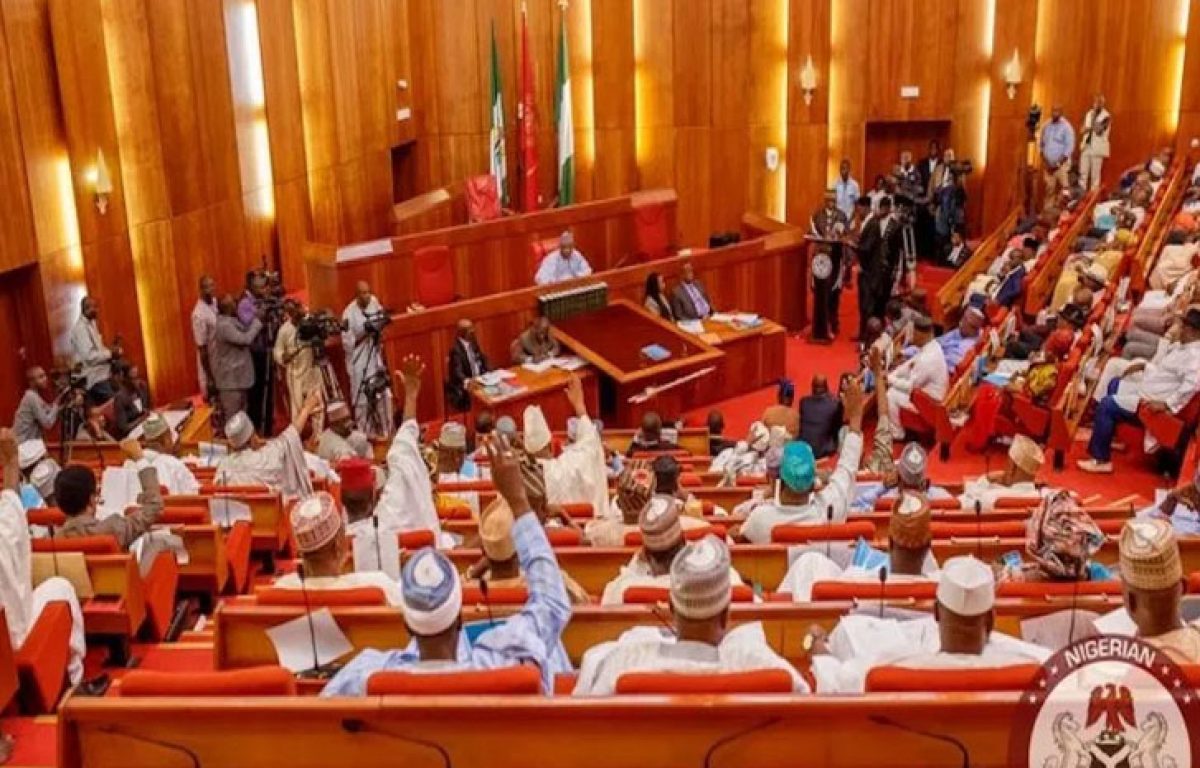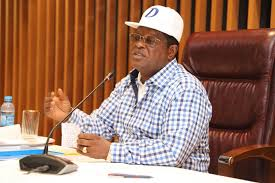Business
Nigeria’s GDP Falls to 1.95%
By Joseph INOKOTONG
Nigeria’s Gross Domestic Product (GDP) grew by 1.95% (year-on-year) in real terms in the first quarter of 2018, but shows a decline of -0.16% when compared to 2.11% recorded in in the preceding quarter.
Data released Monday, by the National Bureau of Statistics (NBS) said the figure shows a stronger growth when compared with the first quarter of 2017 which recorded a growth of –0.91% indicating an increase of 2.87% points.
The NBS notef that quarter on quarter, real GDP growth was –13.40%.
In the first quarter of 2018, aggregate GDP stood at N28,464,322.01 million in nominal terms. This
performance is higher when compared to the first quarter of 2017 which recorded a nominal GDP
aggregate of N26,028,356.03 million thus, presenting a positive year on year nominal growth rate of 9.36%.
This rate of growth is however lower relative to growth recorded in Q1 2017 by –7.70% points at 17.06%
but higher than the proceeding quarter by 2.14% points at 7.22%. To give a clearer depiction, the Nigerian economy has been classified broadly into the oil and non-oil sectors.
The Information and Communication sector which is composed of the four activities of Telecommunications and Information Services; Publishing; Motion Picture, Sound Recording and Music Production; and Broadcasting also recorded impressive result within the quarter.
In nominal terms, the first quarter of 2018 saw the sector grow by 1.79% (year-on-year), a 7.25% points
decrease from the rate of 9.04% recorded in the same quarter of 2017. However, it is 2.34% points higher than rate recorded in the preceding quarter. The Quarter on Quarter growth rate was –3.58%. The Information and Communications sector contributed 10.64% to total Nominal GDP in the 2018 first quarter, lower than the rate of 11.43% recorded in the same quarter of 2017 but higher than the 10.04% it contributed in the preceding quarter.
The sector in the first quarter of 2018 recorded a growth rate of 1.58% in real terms, year on year. From the rate recorded in the corresponding period of 2017, there was a decline by 1.15% points. Quarter on Quarter, the sector exhibited a growth of –4.15% in real terms. Of total real GDP, the sector contributed 12.41% in 2018 first quarter, lower than in the same quarter of the previous year in which it represented 12.46% but higher than the preceding quarter, in which it represented 11.35%.
Nominal growth in the Arts, Entertainment and Recreation sector was 0.41% in first quarter 2018 (year-on-year), representing a decrease of 21.06% points relative to the same period a year earlier, and a decrease of 3.76% points compared with the preceding quarter. On a quarterly basis, growth was recorded at 31.51%, higher than quarter-on-quarter growth of Q4 2017 recorded at 9.54%. The activity contributed 0.28% to total nominal GDP in first quarter 2018, lower than the 0.31% it contributed in Q1 2017 and higher than 0.20% it contributed in fourth quarter of 2017.
In real terms, the activity grew by 0.30% year on year, which was lower than the rate recorded in Q1 2017 by 11.37% points, and lower by 3.24% points when compared with that of the preceding quarter. Quarter on Quarter, growth stood at 31.51% in real terms, higher than quarter-on-quarter growth recorded in Q4 2017 at 9.54%. Arts, Entertainment and Recreation contributed 0.29% to real GDP in Q1 2018, slightly lower than the 0.30% recorded one year before, but higher than 0.19% recorded in the fourth quarter of 2017 by Nigeria’s Gross Domestic Product (GDP) grew by 1.95% (year-on-year) in real terms in the first quarter of 2018. This shows a stronger growth when compared with the first quarter of 2017 which recorded a growth of –0.91% indicating an increase of 2.87% points. Compared to the preceding quarter, there was a decline of –0.16% points from 2.11%. Quarter on quarter, real GDP growth was –13.40%.
Still on the first quarter of 2018, aggregate GDP stood at N28,464,322.01 million in nominal terms. This
performance is higher when compared to the first quarter of 2017 which recorded a nominal GDP
aggregate of N26,028,356.03 million thus, presenting a positive year on year nominal growth rate of 9.36%.
This rate of growth is however lower relative to growth recorded in Q1 2017 by –7.70% points at 17.06%
but higher than the proceeding quarter by 2.14% points at 7.22%. To give a clearer depiction, the Nigerian economy has been classified broadly into the oil and non-oil sectors.
In the period under review, the nation recorded an average daily oil production of 2.0 million barrels per day (mbpd),higher than the daily average production recorded in the fourth quarter of 2017 by 0.05 mbpd.
Real growth of the oil sector was 14.77% (year-on-year) in Q1 2018. This represents an increase of 30.37% points relative to rate recorded in the corresponding quarter of 2017. Quarter-on-Quarter, the oil sector grew by 13.24% in Q1 2018.
The Oil sector contributed 9.61% to total real GDP in Q1 2018, up from 8.53% and 7.35% recorded in the Q1 2017 and Q4 2017, respectively.
Business
Senate Committee Commends Tinubu on Launch of National Halal Economy Strategy to Tap $7.7trn Global Market*

The Senate Committee on Finance has commended President Bola Ahmed Tinubu for launching Nigeria’s National Halal Economy Strategy, describing it as a bold and strategic move to position the country within the lucrative global halal market, estimated at $7.7 trillion.
In a statement signed by its Chairman, the committee praised the initiative as timely and aligned with international best practices. Several countries—including the United Kingdom, Canada, Australia, Malaysia, Indonesia, Saudi Arabia, the United Arab Emirates, Turkey, Brazil, Thailand, and Singapore—have successfully used halal frameworks to boost manufacturing, agricultural exports, financial markets, and foreign investment.
The committee highlighted Nigeria’s strong advantages for success in this space, including its vast agricultural resources, large domestic market, youthful population, growing manufacturing sector, and expanding services industry.
It noted that the strategy fits seamlessly into the Tinubu administration’s broader economic reforms, such as boosting non-oil revenue, diversifying exports, creating jobs, supporting small and medium enterprises (SMEs), and increasing foreign exchange earnings.
President Tinubu, represented by Vice President Kashim Shettima, officially unveiled the strategy on Thursday, February 6, 2026, at the Presidential Villa in Abuja.
The framework, developed in collaboration with Saudi Arabia’s Halal Products Development Company (HPDC) following a bilateral agreement signed in February 2025 at the Makkah Halal Forum, aims to enhance quality standards, certification processes, and competitiveness across sectors like food, pharmaceuticals, cosmetics, tourism, and ethical finance.
The committee described the strategy as inclusive, market-driven, and globally oriented, while fully respecting Nigeria’s diverse and pluralistic society.
It is projected to contribute significantly to the economy, with estimates suggesting it could add around $1.5 billion to Nigeria’s GDP by 2027 and unlock billions more in domestic value over the coming decade through expanded exports and investment.
The Senate Committee on Finance pledged its full legislative support, oversight, and cooperation to ensure smooth implementation, regulatory clarity, and long-term fiscal sustainability in the national interest.
“This decisive step reinforces Nigeria’s readiness to adopt proven international models, unlock new economic frontiers, and establish itself as a competitive player in the evolving global economy,” the statement concluded.
Business
Ex-Naval Chief Named in ₦100m Property Transaction Dispute
A property transaction dispute has emerged involving Zoe New Dawn Nigeria Limited and a former Chief of Naval Staff, following claims by the company’s chairman, Engr. Dr. Stephen Achema Akpa, that a ₦100 million payment made for land was not followed by a transfer of ownership.

According to Akpa, the payment was made in connection with a land transaction reportedly facilitated by the former naval chief. He alleged that despite documented payments, the land in question was neither transferred to the company nor was the money refunded.
Akpa said Zoe New Dawn Nigeria Limited possesses transaction records and related documents which, he claims, support its position in the dispute. He added that the company has initiated steps to seek redress through appropriate legal channels.
The matter has drawn attention due to the profile of the parties involved, particularly against the backdrop of recurring disputes linked to land ownership and property transactions in Nigeria’s real estate sector.
Industry observers note that unresolved land transactions remain a common source of litigation, often arising from disagreements over title documentation, intermediaries, and contractual obligations.
Zoe New Dawn Nigeria Limited stated that it intends to pursue the matter through lawful means to determine liability and recover any funds deemed outstanding.
As of press time, no official response had been issued by the former Chief of Naval Staff regarding the allegations. The dispute has not yet been confirmed as the subject of any court proceedings.
Business
Umahi Inspects Lekki Corridor’s 7th Axial Road Project, Expresses Confidence in CHEC

Minister of Works Senator Dave Umahi over the weekend inspected the progress of the 7th Axial Road project in the Lekki Corridor of Lagos.
The project, located behind the Dangote Refinery, is a crucial cargo handling route for the Lekki Deepwater Port and connects the Lekki Corridor with the Sagamu route.
The Minister expressed confidence in China Harbour Engineering Company Limited (CHEC), the project’s contractor, citing its successful delivery of the Lekki Deepwater Port and high-quality progress on the Makurdi-Enugu road reconstruction and expansion project. Umahi instructed that the roadbed filling work for Project LOT1 be completed by the end of April and directed the project team to accelerate resource input and tangible works to meet the deadline.
The 7th Axial Highway is expected to synergize with key infrastructure projects like the Coastal Road, Dangote Road, and Lekki Port, creating a comprehensive transportation hub model and boosting Nigeria’s port economy and industrial corridor. Umahi emphasized the need for environmental protection agencies to ensure efficient construction and steady progress while maintaining ecological safety.
A representative of CHEC who spoke during the inspection stated that the company would maintain a high level of resource input, implement the Minister’s directives, and coordinate safety, quality, and environmental protection to ensure the project’s timely and high-quality completion in other to unluck its port relief and regional economic benefits.
-

 Uncategorized5 years ago
Uncategorized5 years agoFG, states urged to harness flooding for ranching, others with technology – Agbaje
-

 Headlines10 years ago
Headlines10 years agoBreaking: EFCC seals Borno House of Assembly, as Hon members take to their heels
-

 News12 years ago
News12 years agoNigeria Security Operatives Stage Manhunt For Homosexual Perpetrator
-

 News9 years ago
News9 years agoHow 21-year-old Girl fled community over accusation of lesbianism
-

 News10 years ago
News10 years agoYobe Gov Moves Against Deputy
-

 Opinion7 years ago
Opinion7 years ago7 signs she has friend zoned you
-
Technology4 years ago
Online job placement company headhunts women
-

 Headlines10 years ago
Headlines10 years agoBorno Dep Gov Abducts Another Church Leader





